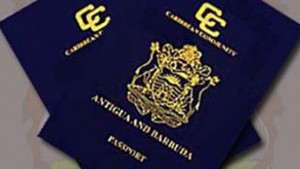By Caribbean News Now contributor
 ST JOHN’S, Antigua — In the wake of the arrest of its former UN permanent representative Dr John Ashe on tax evasion charges relating to alleged bribes paid to him, the government of Antigua and Barbuda has announced what purport to be major changes to the policy governing the issue of diplomatic passports.
ST JOHN’S, Antigua — In the wake of the arrest of its former UN permanent representative Dr John Ashe on tax evasion charges relating to alleged bribes paid to him, the government of Antigua and Barbuda has announced what purport to be major changes to the policy governing the issue of diplomatic passports.
According to the government’s chief of staff Lionel ‘Max’ Hurst, diplomatic passports will now be issued to ambassadors at large, all ministers of government, the leader of the opposition, and president of the senate and the speaker of the house.
Former prime ministers, governors general, national heroes, knights, dames and their spouses will also be issued diplomatic passports.
Hurst also said that “official passports” will be issued to senior government officials, members of the senate, special economic envoys and those who the government believes will use the document to further the development of Antigua and Barbuda. It is not entirely clear if “official” is synonymous with “diplomatic” or if the new policy represents any real or effective change.
“What we want to do is to ensure that when passports are issued there is a policy governing them and that those people who ought to have diplomatic passports will have them and those who ought not to will not have to opportunity to bear them,” he said.
A so-called diplomatic passport is generally issued for official international travel and residence to a country’s diplomats – persons appointed by a state to conduct diplomacy with other states and/or international organizations – and their accompanying dependants.
However, the broader subjective definition apparently embraced by Antigua and Barbuda, namely, anyone who will use the document to further the development of the country, hardly seems calculated to limit the issue of diplomatic passports.
In particular, according to reliable sources, the following three individuals associated with the Antigua and Barbuda citizenship by investment programme are holders of that country’s diplomatic passports:
– Fahd Sattar Dero, the son of Sweet Homes owner Abdul Sattar Dero
– Vitaly V Kryuchkov, chairman of the TDI Group
– Ali Dakouri, owner of CTrust Global
Repeated requests for confirmation of this and clarification as to whether such passports were issued by the former or current government have failed to produce any response from the Antigua and Barbuda government.
The matter of diplomatic passports being issued in conjunction with regional citizenship programs famously arose two years ago when an Iranian bearing a St Kitts and Nevis diplomatic passport tried to enter Canada, claiming he was there to see the Canadian prime minister, in breach of all protocols relating to the visit of foreign officials entering a country on official business. He had no appointment. He was an unknown. He could not state the nature of his diplomatic engagements.
When questioned, Alizeera Moghadhan, a St Kitts and Nevis economic citizen, told Canadian officials that he paid $1 million for his diplomatic passport.
The government of St Kitts and Nevis later acknowledged issuing a diplomatic passport to Moghadhan, purportedly as a special envoy to Azerbaijan and Turkey with the mandate “to explore areas of interest to the Federation.”
Some years earlier, in 2004, Reuben Morgan, a relative by marriage of St Vincent and the Grenadines (SVG) attorney general Judith Jones-Morgan, was arrested in London travelling on an SVG diplomatic passport but also carrying a kilo of cocaine in his luggage.
Morgan apparently had no official ties to the country’s foreign affairs department or diplomatic missions overseas and Morgan never had any diplomatic standing.
The misuse of diplomatic passports was referred to in a February 3, 2006, cable sent by Mary Kramer (then US ambassador to Barbados and the Caribbean), in which she suggested that influence may be purchased to further legitimate business concerns, but in the case of “the bearers of passports to which they are not entitled”, such influence could be used for more nefarious purposes.
